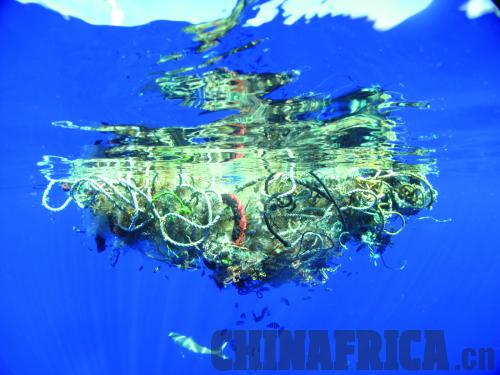| 
The halos that span South Africa's coastline are anything but angelic. Fanning out around four major urban centers – Cape Town, Port Elizabeth, East London and Durban – they are made up of innumerable bits and pieces of plastic. As a form of pollution, their shelf life is unfathomable. Plastic is essentially chemically inactive. It's designed to never break down.
Dr. Peter Ryan has been studying plastic pollution since the 1980s. Back then, he says, "In the pantheon of problems that faced the planet, it wasn't one of the biggest ones out there." An ornithologist at the University of Cape Town, he primarily looks at how the pollution impacts seabirds like white-chinned petrels and fulmars in the Indian Ocean and South Atlantic.
"The rates of ingestion are amazingly high – there are species where more than 90 percent of birds contain plastic," says Ryan. Petrels, for example, regurgitate the material to feed to their chicks, and it often lodges in the hind section of the birds' two-chamber stomachs, adults and babies alike. "That," says Ryan, "really passes on the problem on to the next generation."
But the birds are hardy. "They feed on nasty, spiky things all the time," he explains. "It's amazing what they can withstand." Plastic, though, is equally resistant (if not more so) to digestion. "You find birds that have swallowed [metal fishing] hooks – the hook has gone right through their stomach lining – and [from the lining] they form a callous around the tip of the hook and carry on." Digestive juices are acidic, and can corrode metal over time but not plastic. "Plastic stays," says Ryan. "Metal fishhooks get digested away."
Twenty-five years ago, he explains, the plastic in South African waters consisted primarily of what's known as nurdles or pre-production pellets, "the seed stock of the plastic industry." Eighty percent of what birds were eating then were pellets, says Ryan. "[Now] that's completely switched around. Now 80 percent is non-pellets." The plastic is bigger, colored – the remnants of manufactured items, ranging from thick plastic fish trays to brightly hued soda bottles and candy wrappers.
Manufactured plastic, unlike a pellet, is full of persistent organic pollutants. These compounds are hydrophobic and will adhere to whatever plastic they can find floating in the sea. Exposed to sun and battered by waves, the material then breaks down to bits just a few millimeters across: the size birds tend to eat. "It's a deliberate choice, it's not just taken in incidentally with other things, it tends to be the more colorful items that are more visible," Ryan says about the process. "It's increasing their body loads of nasty compounds that they don't need in their system."
This situation isn't unique to South Africa. Plastic pollution is a global problem. All oceans contain large networks of currents, also known as gyres, which rotate constantly. Wherever there is plastic, there is the possibility it will be swept into a gyre, accumulating alongside other plastic. According to organizations like the American 5 Gyres Institute, it's hard to measure just how big these patches are, but they will only grow worse without effective action. "We can see the amounts of plastic in seabirds are starting to [significantly] increase in the South Atlantic," says Ryan. "The stuff isn't going anywhere, it's just sitting out in the ocean."
There are few fixes for a problem so incredibly large in scale. Consumers can help, though, by taking on a new cost. "The environment bears the cost of inappropriate disposal [of plastic]," says Ryan. "We need to make those costs explicit to buyers."
Tech Bytes
➲ In March, Apple celebrated 25 billion mobile app downloads. The app in question was "Where's My Water," created by Disney and downloaded by Fu Chunli, a resident of Qingdao, China. Considered a puzzler, the app deals with physics problems. Fu was awarded a $10,000 gift certificate from Apple's iTunes store for having helped the company reach its milestone. Its App Store has only been open for four years.
➲ Chinese online video behemoths Youku and Tudou are merging. The two web portals are partnering to try to gain market share against competing businesses in China's busy streaming video landscape. Together they still only account for less than 40 percent of the country's online video sector, according to Internet research firm Analysys International. But with the new merger, their joint stock is now valued at more than $1 billion. |